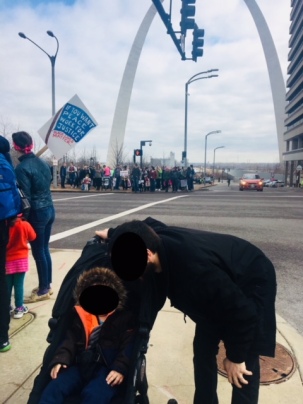We went to the anniversary Women’s March in St. Louis last Saturday!

Now, if I’m being honest, we weren’t sure we were going to go. It wasn’t something that we planned our day around. But when we realized everyone was awake and in a good mood (and actually needed an outing to stay sane that day), we decided to stop by the Women’s March in St. Louis. We missed the actually marching (my favorite part from 2017! The energy and enthusiasm was such a salve after the sadness of the inauguration day before). But we arrived for some of the speakers and heard some passionate, badass people talk about badass things.
Last year, A was small enough that he just sat in his carrier and looked around. This year, A is wiggly and energetic enough that we let him get out and walk around. There were no questions of safety for A, which some parents may worry about when deciding to attend a big event like this. At one point, we were close to a very loud speaker and concerned about hurting his ears, but we just moved away and that was that. It’s my mentality that the child’s immediate physical needs come before the rally/protest (which is a privileged perspective but one I hold): when A needed to wiggle or eat, that’s what we prioritized. Last year, when he needed to nap and wasn’t falling asleep in the carrier, I left the rally so that he could nap. I think that mentality—of prioritizing your kid’s physical needs—can make events seem less intimidating to parents who are hesitant to go.
It was a great experience for A overall. He clapped when others clapped. Watched dogs and looked at colorful signs. Will he remember that he went to the 2018 Women’s March? No. Did he understand any of the political messages? No. But being at an event like that normalizes activism and protest from an early age. Honestly, the introvert in me never really wants to rallies, but, as a parent, I want A to know that rallies and protests are a healthy, essential part of democracy.
Happy wiping!

